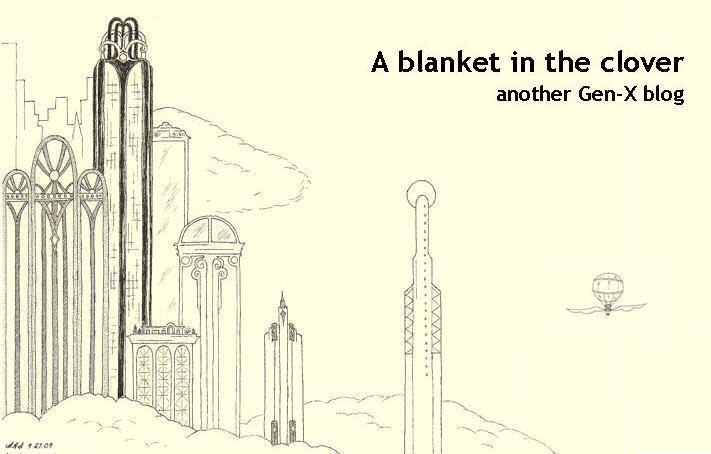You spend a couple of weeks getting to know this person, and he starts enjoying life. Then you discover technology that can transform him back into the two people he originally was — the two people whom you need and want back. But of course, he doesn't want to be transformed.
This is a storyline from "Star Trek: Voyager," which I recently started watching on DVD. I'm about halfway through the series, so I figured this would be a good time to write about why it rocks.

First: A great ensemble cast, with cool characters and, in general, better acting than you see on "Next Generation" (the incomparable Patrick Stewart notwithstanding).
Second: An awesome premise. They're lost in an unknown region of space, far, far away. Forget Earth, forget Vulcan. This is real uncharted territory, which sort of harks back to the exploratory tone of the original series.
Third: Finally, a little darkness. Compared with the other "Star Trek" series that I've watched regularly (TOS and TNG), "Voyager" is a regular "Battlestar Galactica." They're not exactly throwing people out of airlocks, but the show isn't afraid to explore disturbing territory.
A good example is the episode I referred to above, the one with the transporter accident. This installment, called "Tuvix," forces Captain Kathryn Janeway (the fantastic Kate Mulgrew) to choose whom should get to live. A less challenging show would have had the new guy do some soul-searching and bravely submit to the procedure, or perhaps a fortuitous spatial anomoly would have just set things right. But "Voyager" forced Janeway to make the hard decision. I didn't agree with what she did, but I was impressed that the show made her choose.
Other examples: In "Meld," the Vulcan security chief, Tuvok, mind-melds with a murderer and discovers certain dark impulses within himself, some of which he enacts rather chillingly on the holodeck. In the creepy and claustrophic "The Thaw," one of the crew is trapped in a virtual world where an AI program presents fearful images derived from his subconscious, threatening to literally scare him to death. And in another great one, "Deadlock," Janeway discovers that the crew has been duplicated, and that the duplicate people are existing — and evolving — in a separate strand of space-time. Because of various environmental factors, only one of the crews can remain; the other has to be destroyed. It's a weird episode, one that raises interesting questions about identity. I actually thought the story was too big for an hour-long episode; I would have preferred to see it expanded, perhaps to include a better examination of the differences between the original people and their duplicates. Still, a great show.
Of course, in classic "Star Trek" tradition, there is also a fair amount of cheese, and the show takes bad science to a whole new level. (Don't get me started on the writers' clear confusion over what is meant by the term "evolution.") There are holodeck programs gone wild, an appearance by Amelia Earhart, and plenty of body-swapping. In one episode, a character actually utters the line, "Let me go after the shuttle. It is the only way we can get everybody back into the right body!"

But this is all part of that good old "Star Trek" charm, and the engaging "Voyager" characters make you forgive the series' flaws. One of my favorites is Tuvok, who, because he's a full Vulcan, is in many ways more interesting than Spock. His demeanor reminds me a little of the enchanted Stephen Black from the great novel "Jonathan Strange and Mr. Norrell." Another good one is B'Ellana: half-human, half-Klingon, she has the fire of a Klingon without being caught up in all the hokey rites, and she's one of many strong female characters on board. I also like the holographic doctor, particularly when he's exploring his identity with the telepath, Kes.
Speaking of Kes, I just got to the Kes/Seven changeover. If you don't know the series at all, Kes used to be the show's token "pretty girl." The character went away after the third season and was replaced by Seven of Nine, a Borg refugee played by the gorgeous Jeri Ryan. There's been a lot of speculation about why Kes was eliminated from the cast. Whatever the reasons, I thought she was a really good character, and the actress (Jennifer Lien) had a nice way about her. Her chemistry with the doctor and with several other characters was quite good. At the same time, with Seven of Nine, the show is able to explore some intriguing new avenues. Jeri Ryan is so beautiful that sometimes it's a little distracting, but overall she's not bad, and the writers give her some wonderful dialog. (The title of this post is a line she delivered, as an addendum to her admission that the cook had prepared a particularly foul meal.)
As I mourn the passing of "Terminator: The Sarah Connor Chronicles," I'm glad to have discovered this little gem of a series, the entirety of which is available from Netflix. If you're jonesing for some decent sci-fi in this current dearth, I suggest checking it out. Of course, it can't really replace the SCC, but it does feature Sarah Silverman, in a guest spot, calling a Vulcan a "freakasaurus." What other TV show can give you that?





No comments:
Post a Comment